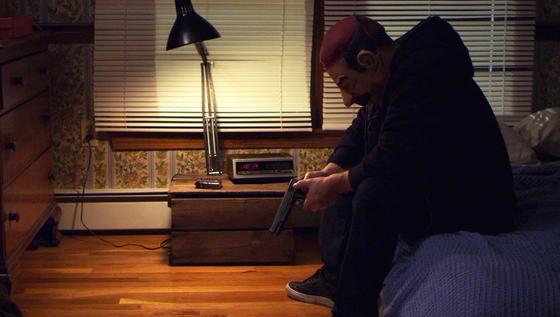 Back to selection
Back to selection
Five Questions with Booster Director Matt Ruskin

Too often contemporary crime dramas binge on the crime and skimp on the drama. This is not the case with Booster, director Matt Ruskin’s debut narrative feature, and his followup to Sundance Channel documentary The Hip Hop Project. The story of Simon, a Boston-based petty thief forced to turn to serious robbery after his brother is arrested, Booster features stellar performances from a handful of Boston natives, as well as veteran character actor Seymour Cassel. Ruskin’s film wrestles with provocative moral issues, taking care to imbue even its most externally-loathsome characters with life and heart. Premiering in Narrative Competition today, Booster is sure to please audiences looking for a smart, meditative drama.

Filmmaker: The film strives for an authenticity and level of emotion not seen in many of modern-day crime films. How did you go about getting into Simon’s head, and building out his story?
Ruskin: The lead actor, Nico Stone, is my oldest childhood friend and he and I would talk about the story on a daily basis while I was writing the script. We both felt strongly about telling the story in the most honest way that we could. In many ways this guys is an anti-hero, so the idea of trying to glorify the crime elements didn’t make sense for the story. Instead, we wanted to make this character’s discomfort and internal struggle palpable. We tried to flesh out all of the contradictions and conflicting motives that often come to the surface when people have to make really difficult choices. And we made him smoke a lot of cigarettes in case none of that worked.
Filmmaker: What were some of your major influences for the project? Were there particular directors or films that served as inspiration?
Ruskin: I love American films from the 1970s. A lot of those films feel completely authentic. Also, Gomorrah by Matteo Garrone was required viewing for our crew. I was blown away by how real everything seemed. I had no idea who was an actor and who wasn’t. It definitely inspired us to try to mix actors and non-actors.
Filmmaker: The film has a strong and authentic sense of environment. I know Boston is your hometown – how familiar were you with the specific locations and culture that the film explores?
Ruskin: I was lucky enough to know a lot of different kinds of people growing up. The story is fiction, but it was definitely influenced by people I knew. Nico and I had always wanted to make a film together and so we embraced the idea of casting non-actors who were familiar with the world depicted in the film. We wanted everything to feel authentic, so we utilized real people as much as possible. That was true for locations too. There were places in Boston that I always wanted to film, and Nico had a wealth of great locations. We would just drive around neighborhoods near where he lives and find spots that looked right for the film. The guy could be a location scout.
Filmmaker: How did Seymour Cassel get involved? What was it like working with him?
Ruskin: I got hooked up with Seymour through a friend who had recently made a movie with him. We sent him the script at the last minute and he called me about a week before we started shooting. It turns out that when he was in the military he was stationed outside of Boston, so he had a ton of old stories about what the city was like in the early 50’s. He has some wild stories from those days and he loved Boston, so he really took to the script.
Filmmaker: What are your long-term goals for Booster? What types of audiences do you hope the film reaches?
Ruskin: I hope that the film has a good festival run and finds a distributor, both here and abroad. I think it will really appeal to art-house audiences. It’s as much about family as anything else, so I think it speaks to people who wouldn’t ordinarily gravitate toward a crime film.
